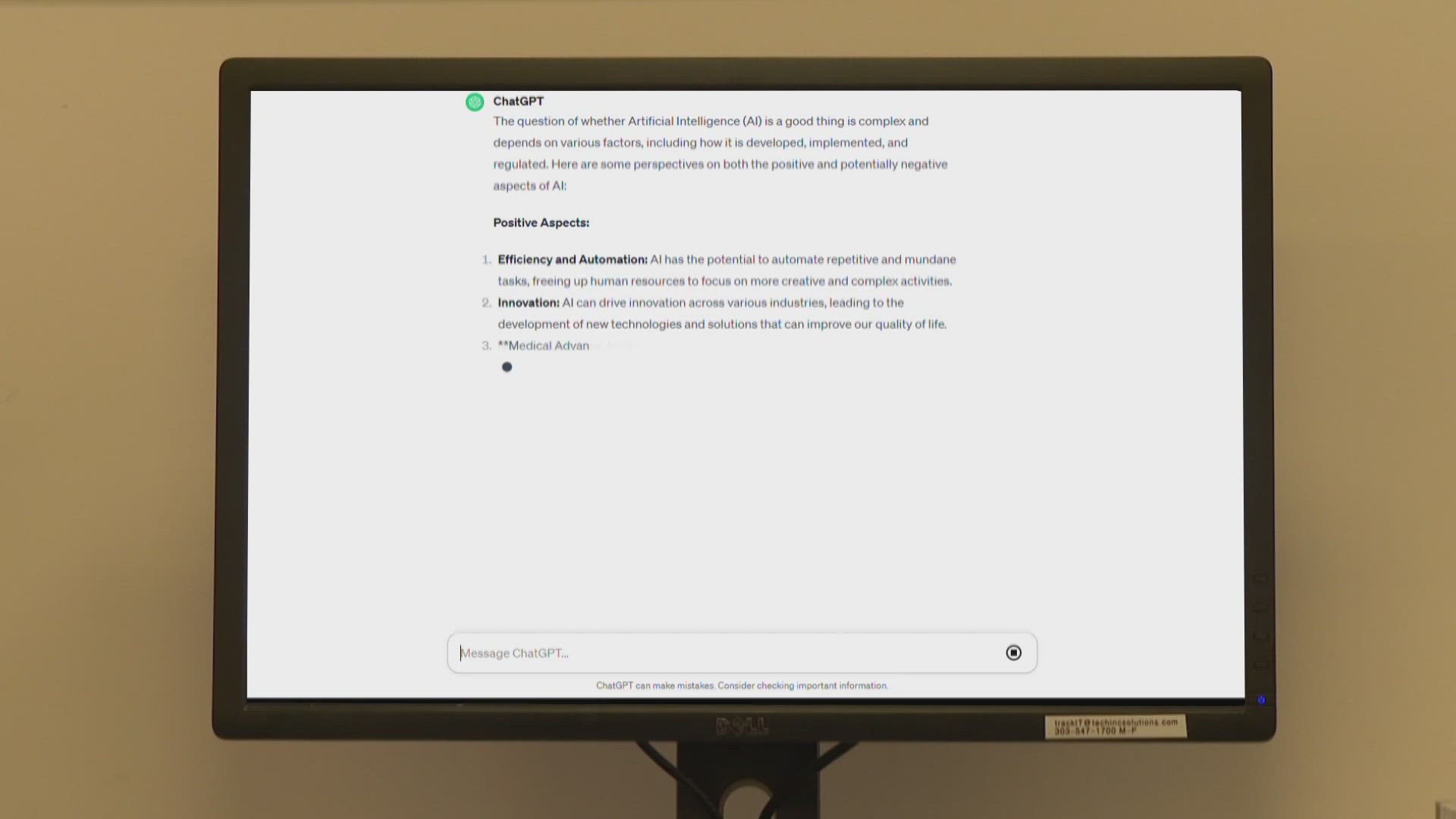DENVER — The Colorado Education Initiative (CEI), a statewide nonprofit, created a steering committee to come up with best practices on the use of artificial intelligence in classrooms.
A lot of talk around AI centers on the negative consequences of the new tool, but CEI President and CEO Rebecca Holmes hopes the committee finds ways for the tool to do some good. The committee hopes to have its recommendations and best practices done sometime in June.
Holmes sat down with 9NEWS to talk about the committee and its goals.
(Editor's Note: Responses may have been lightly edited for clarity).
9NEWS: What is the Colorado Education Initiative?
CEI President and CEO Rebecca Holmes: "CEI is a statewide nonprofit focused on K-12 education across Colorado. We’ve been around for about 16 years. We have an important relationship with the state Department of Education and we work in about 100 of Colorado school districts."
9NEWS: What are some of the things CEI does for these school districts?
Holmes: "We work on school improvement efforts. We work on major transformation and we spent a lot of time with districts that are rethinking high school, reimagining the high school experience to have it be more relevant and more rigorous for today’s young people."
9NEWS: How did this idea of a steering committee come about?
Holmes: "We want Colorado to be right on the forefront of smart uses of AI in K-12 and we’ve seen only a handful of other states come forward to say we probably need a state plan. We need a state plan that addresses good practice, good tools, and good policies so that our young people don’t fall behind in terms of the really tech enabled industries that can go into not just work in but lead in."
9NEWS: So is CEI the driving force in this committee?
Holmes: "Yes, this is a role we’ve played a lot in the state on various issues that come up that can be sort of disruptive to K-12 education. We act as a convener, we get people in the room that don’t usually work together, so in this case we’ve got educators alongside tech entrepreneurs alongside policy makers coming together to say, 'What’s the best way to make sure AI comes out into Colorado in our school in ways that are equitable, that make sure every kid is prepared and that really drive the future of teaching and learning in positive and productive ways for kids and for teachers?'"
9NEWS: Why is it important to start talking about best practices?
Holmes: "The young people in our high schools right now are really smart and they’re more focused on the world of work than I think past generations were, so they know. Young people will tell us, 'Any job I go into will probably be influenced by technology, and by AI in particular.' They want to be prepared for that future, and schools can be sort of out of touch with their young people if we say, 'Just don’t use this tool until you get into the workforce.' So the urgency is really coming from high school students to say, 'I want to be ready for this, I want to know how to responsibly and smartly use this tool because my employers and my life will demand that of me.'"
9NEWS: What is an example of AI being used in the classroom for the better?
Holmes: "So one way we’re seeing this, and it’s one of the three priorities for the steering committee, is to think about how AI makes a teacher's job easier. So as an educator, years ago, I used to spend a lot of my Saturday afternoons trying to take a text and make that text accessible to kids who read on a 4th grade level and kids who read on a 10th grade level — you can do that within seconds for an AI tool. So for younger students, less about AI in the classroom with young people and more taking sort of laborious tasks off the plate of the teacher so the teacher can be more free to do those real human-centric tasks that we want our educators to do.
In the high school space we’re seeing this leapfrog our ability to teach young people about media literacy. I would say, as educators, we sort of fell behind in teaching people about media literacy, and now they know more often than the adults do because they’re seeing deep fakes, they’re seeing computer generated imagery in their social media and they honestly often know more than the adults do about how to be a savvy consumer of AI-produced media."
9NEWS: After the steering committee shares its recommendations, what do you hope happens next?
Holmes: "What we most want to make sure happens is that Colorado stays on the cutting edge. In many cases, from an employment standpoint, Colorado is a bit of a tech hub and we want young people that are prepared to go into work and lead in those industries. We also want our policy to be smart. We want policy that’s informed by young people and their experiences, policy that’s created in part by educators who have that lived experience in the classroom with these new tools and to have policy that does something we’ve never seen policy do, which is iterate and move as quickly as the technology changes."
SUGGESTED VIDEOS: Latest from 9NEWS

